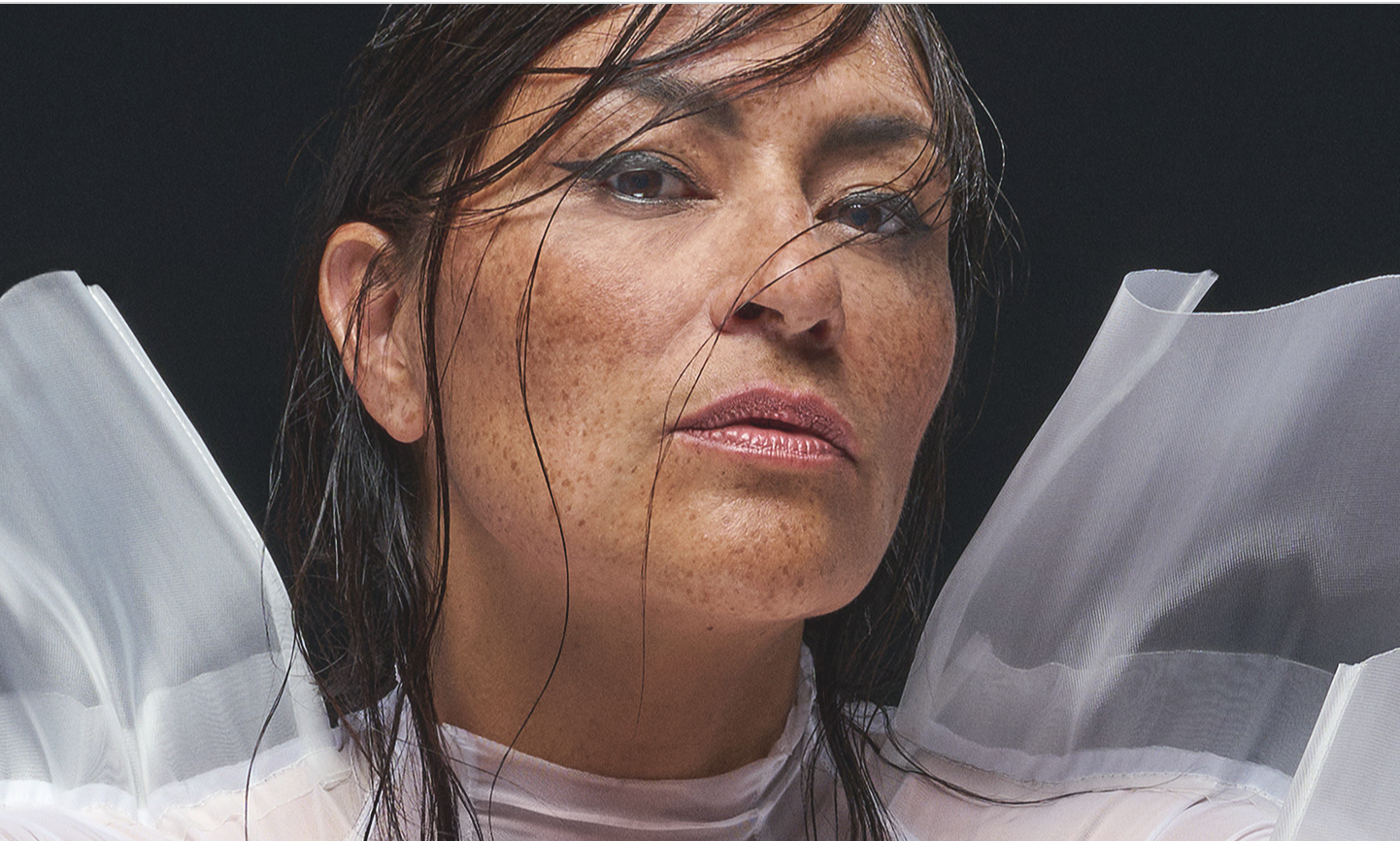Inuk singer Elisapie gets deeply emotional on Inuktitut
Recording her new album of cover songs was intensely heart-breaking
Elisapie.
Chan Centre and Vancouver International Film Festival present Elisapie—Uvattini at the Chan Shun Concert Hall on September 28 at 8 pm
SHOULD YOU FIND yourself weeping while listening to Elisapie’s new album, Inuktitut, don’t worry: you’re not alone. In fact, if you pay close attention to “Qimmijuat”, the hushed and beautiful version of the Mick Jagger/Keith Richards classic “Wild Horses” that closes the record, you’ll hear the Inuk singer’s own tears.
Recording it, the singer-songwriter born Elisapie Isaac says, was a heartbreaking and private experience—but one she’s unafraid to share.
“Even though it’s about separation or parting ways, it’s still about trying to remind ourselves that we still believe,” she explains in a Zoom conversation from her Montreal home. “No matter the hardships, there’s still beauty. There’s still life after death. So definitely it just felt so natural to finish with that song. It makes me very emotional, that one. I can actually hear the tears rolling down on the last two lines—or on the second line before the last chorus. I realized that I was crying, but we kept it like that, and it’s very much a raw moment, an honest moment.”
Inuktitut didn’t necessarily start life with such noble aspirations. The record began, more or less, as a kind of lockdown diversion: why not, Elisapie reckoned, do Inuk-language covers of some of the tunes that were percolating through her earbuds while she was jogging in Montreal’s picturesque parks? And at first, she admits, the intent was to show how hip and eclectic her tastes could be.
“I thought ‘Oh, I’m not going to do these popular songs; that’s not me. I’m a lefty, so I’m going to do something a little bit different,’” she says, laughing. “And that’s a great idea, but there was no link to my world when I was a kid, so it wasn’t working. Very quickly we realized that we were going to have a lot of hit songs, because those were the ones that made me cry.”
Blondie’s ”Heart of Glass”, Cyndi Lauper’s “Time After Time”, Metallica’s “The Unforgiven”: hit songs abound on Inuktitut. All have been translated into Elisapie’s mother tongue, which gave the record its title, and most receive rather reflective or even sombre arrangements. But there’s more than just the singer’s sensitive translations and guitarist Joe Grass’s well-considered backdrops to the disc. As Elisapie got deeper into the process of song selection, she realized that every song was a kind of musical memory box, taking her back to moments from her childhood—some happy, some bittersweet, some devastatingly sad.
If her previous album, The Ballad of the Runaway Girl, was literally autobiographical, Inuktitut is a more oblique and abstract kind of memoir: a life in 10 songs.
“It’s actually a very, very intense, personal journey,” says Elisapie, who brings her multimedia show Uvattini to the Chan Centre on September 28. “And it’s funny: these are not my songs, but I think they carry a lot of our stories: northern Inuit stories. And that’s what I needed to focus on.
“I realized that making art or making music doesn’t always have to be such a deep, personal creation,” she continues. “If the memory and the emotion are there, I think you can create a lot of things even when you steal songs, and that’s what I did. I thought ‘Well, what do I have to say about that time with this song?’ And I realized that each song that I chose had a Polaroid in it. It was so vivid, and I thought I had to do something with that.”
“Qimatsilunga”, her take on Queen’s “I Want to Break Free”, is a prime example. Written by bassist John Deacon, it’s a fairly conventional breakup song given a deeper societal spin by a video in which all four band members dressed in drag, paying tribute to singer Freddie Mercury’s status as a gay icon. But when Elisapie sings it, she’s thinking of her cousin who committed suicide at a young age. He “broke free” with that irrevocable gesture, one that still haunts the singer and the rest of her family to this day.
The same is true of “Qaisimalaurittuq”, her interpretation of David Gilmour and Roger Waters’s paean to Pink Floyd’s acid-casualty founder, Syd Barrett, “Wish You Were Here”. “We’d listen to it over and over when we were kids, mourning our cousin,” the singer explains. “So with that I went into a tunnel to a place that’s so personal. Even though the words are a little bit complicated and not necessarily easy to translate word-for-word, the meaning of it makes sense. And that was my work: to really take the meaning and make it into the Inuk view, the vision.”
That vision, the trilingual singer adds, is fundamentally different from how other ethnicities—notably French and English—see the world, and this difference is readily conveyed by language. French, she explains with a whoop and outspread arms, is florid and effusive; English is analytical and vocabulary-dependent.
Inuktitut, in contrast, is “so much simpler—there’s less expressing of every little detail. Things are simplified, and when we speak something, when we say something, it has to be meaningful because we don’t fuss around. It’s just the way we view the world.”
In that light, then, is her birth language a tool for getting to the essence of things?
“Absolutely,” Elisapie confirms. And on Inuktitut she has done just that, using others’ words to create an intimate and insightful look at life in the North. ![]()

























